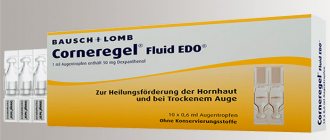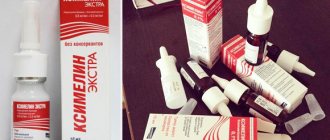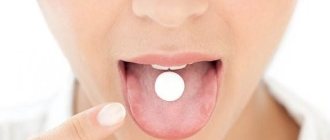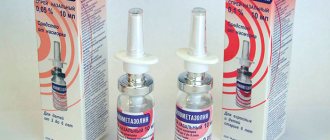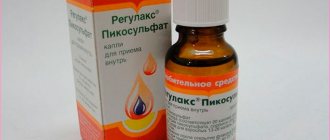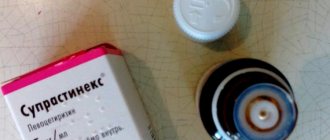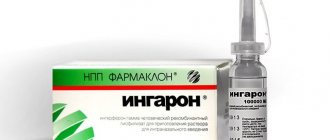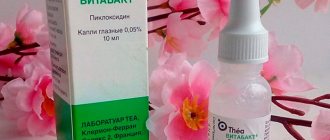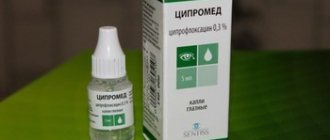Valoserdin drops are a combination drug that affects the cardiovascular and central nervous systems. The drug has a pronounced antispasmodic, vasodilator, and sedative effect. The medicine does not treat the underlying pathology, but is intended only to relieve unpleasant symptoms. To avoid the development of possible side effects, you must strictly follow all recommendations for use specified in the instructions.
Contraindications
The medicine should not be taken if:
- hypersensitivity to the components of the drug;
- porphyria;
- breastfeeding;
- problems with liver and kidney functions;
- pregnancy;
- under 18 years of age.
In addition, this drug is contraindicated for liver diseases, traumatic brain injuries, alcoholism and brain diseases.
Indications for use
The drug is prescribed as a sedative for a neurosis-like state with increased irritability and mental lability, and for functional disorders of the cardiovascular system.
The main indications for use of Valoserdin are presented in the list below:
insomnia, light, intermittent sleep, problems falling asleep;- discomfort and pain in the left half of the chest, in the heart area with spasm of the coronary vessels;
- spastic cardiac pain;
- neurosis-like disorder;
- anxiety, restlessness;
- sinus tachycardia;
- spasms and colic of the gastrointestinal tract organs of a neurovegetative nature.
Can the drug be used for high blood pressure?
In the complex therapy of arterial hypertension, sedative herbal preparations are used. Alcohol tinctures have a wide spectrum of action. Indications for taking the medicine are also neurocirculatory dystonia of the cardiac type, neurasthenia against the background of cardiac pathology. Essential oils of mint and Spanish hops not only soothe, but also to some extent help reduce and normalize blood pressure and blood pressure.
The main effect is achieved due to the effect on the nervous system, relaxation of the walls of blood vessels, a decrease in the heart rate and a compensatory decrease in blood pressure. Thus, Valoserdin improves blood circulation, including in cerebral vessels, reduces venous congestion, and eliminates arrhythmia. As a prophylaxis, it is prescribed for sinus tachycardia due to dystonia.
Overdose
If the overdose is small, drowsiness , psychomotor disturbances , and dizziness . Large doses can lead to coma , respiratory depression , vascular collapse , decreased blood pressure , tachycardia , and decreased peripheral reflexes .
Overdose is treated by gastric lavage and taking activated charcoal. You definitely need to call a doctor.
Side effects
The instructions for Valoserdin indicate that this drug is usually well tolerated even with long-term use. In some cases, mild dizziness and drowsiness may occur during the daytime. Also, with long-term use of large doses of the drug, chronic bromine poisoning can develop, the manifestations of which are noted in the form of: depressive mood, apathy, rhinitis (runny nose), conjunctivitis, hemorrhagic diathesis, and impaired coordination of movements.
If any side (unusual) effects occur that are not listed in the instructions, the patient should report this to his doctor.
Interaction
If you combine this drug with other sedatives , as well as with antipsychotics and tranquilizers , the effect is enhanced. CNS stimulants , on the contrary, weaken the effect of the drug components.
It is not advisable to use phenobarbital together with drugs that break down in the liver. In addition, the drug weakens the effect of coumarin , griseofulvin , corticosteroids and contraceptives intended for oral administration.
conclusions
The action of Valoserdin is due to the pharmacological properties of the components in its composition. The combination of an alcohol tincture with essential oils, phenobarbital and bromisovalerianate has a mild calming, sedative and hypnotic effect. The drug helps reduce the excitability of the central nervous system, normalizes sleep patterns, and reduces spasm of the coronary vessels. It is used in combination therapy of arterial hypertension, somatomorphic dysfunction of the autonomic nervous system, and functional digestive disorders. Before starting the course, you should consult your doctor.
Analogs
Level 4 ATC code matches:
Alora
Motherwort Extract
Novo-Passit
Cardiovalen
Liked
Carmolis
Valerian tincture
Lotusonic
Relaxil
Persen Forte
Persen
Phytosed
Sedavit
Motherwort Forte Evalar
Dormiplant
Sondox
Sedafiton
Peony tincture
Menovalen
Bromcamphor
On forums people often wonder what the differences are between this drug and its analogs, Corvalol and Valocordin , as well as what each of these drugs helps with. In fact, all three medications have the same properties: they reduce the excitation of the central nervous system. Do they have any differences?
Valoserdin or Valocordin
The differences between Valocordin and Valoserdin are insignificant. The latter is a complete analogue of the German Valocordin , except that it contains oregano oil. Both medications can be easily obtained in pharmacies. But what is more profitable to buy, Valoserdin or Valocordin ? The domestic drug is much cheaper. Meanwhile, Valocordin has not been sold in Germany for a long time. It is produced exclusively for export. And since the price of Valoserdin is much lower, while its effect is the same, many prefer the Russian analogue.
Which is better Corvalol or Valoserdin
Corvalol began to be produced in the 60s of the twentieth century at the Kiev Pharmaceutical Plant. Now these drops are produced by a pharmaceutical company, which was created on the basis of the plant.
Which is better Corvalol or Valoserdin ? In fact, both drugs are the same. Except that the latter began to be released a little later. But the price of Corvalol is slightly lower, so many people prefer it.
How does the medicine work?
A medicinal product based on herbal components has a mild calming effect, like Valerian or Motherwort.
The drug Valoserdina contains Phenobarbital, which reduces the increased excitability of the central nervous system, improves sleep, aligning the phases of deep and restful sleep. Ethyl bromizovalerianate has a positive effect on the cardiovascular system, reduces coronary spasm and cardiac pain, and heart rate. Oil of peppermint and Spanish hops, oregano, has an antispasmodic effect, dilating blood vessels, normalizing blood flow. Combination drugs based on phenobarbital are effective for the treatment of neurovegetative disorders. Considering the presence of barbiturates and bromine in the composition, in case of overdose the drug has a pronounced hypnotic, antiepileptic and tranquilizing effect. To prevent adverse reactions, when calculating the dosage, the instructions for use of Valoserdin must be taken into account.
How long after taking does the effect appear?
Currently, the drug is available for sale in pharmacy chains in dropper bottles, with a clear liquid without a characteristic color, with a specific aromatic smell of mint and oregano essential oils. Valoserdin is not available in tablets. The medicine is an alcoholic infusion of ethyl alcohol, due to which the product is quickly absorbed after dissolving the drops in a glass of water and taking it orally. The therapeutic effect is observed within 1 - 2 hours, the peak concentration in the bloodstream remains for 3 - 5 hours, taking into account which the frequency of drug administration is calculated.
Valoserdina price, where to buy
The average price of Valoserdin in 25 ml bottles is 40 rubles. However, in many pharmacies the cost may be higher. For example, 50 rubles or more for a 15 ml bottle.
- Online pharmacies in RussiaRussia
ZdravCity
- Valoserdin drops for internal use.
approx. 25ml ZAO Moscow Pharmaceutical Factory 63 RUR order - Valoserdin drops for internal use. approx. 15ml ZAO Moscow pharmaceutical factory
50 rub. order
Directions for use and doses
Alcohol tincture of Valoserdin should be taken orally, half an hour before meals, after dissolving the drug in half a glass of drinking water. It is not recommended to mix the medicine with juice, tea or other drinks. The dosage is calculated taking into account the underlying pathology and the severity of symptoms.
For an adult, it is usually 10–20 drops up to three times a day. In case of heart rhythm disturbance, sinus tachycardia, the number of drops increases to 30 - 50.
For children, the dose is calculated taking into account their age; for 1 year of life, 1 drop of tincture. The medicine should be dissolved in a glass of water, at least 40 - 60 ml.
It is not recommended to lower or increase the dosage of the medication on your own. The duration of taking the drug is determined by the attending physician.
What sedative can a mother take while breastfeeding, Komarovsky’s opinion, reviews
Any medications should be taken with reasonable caution during breastfeeding. Whether to drink a sedative during lactation is a controversial and controversial issue.
Mother's stress negatively affects the baby's mental state and contributes to a decrease in milk production. Therapy is necessary, but there are no absolutely safe medications.
Therefore, nursing mothers are interested in the question of what sedatives can be taken during this period without harm to themselves and the baby.
What sedative can you use while breastfeeding?
Resorting to sedatives during lactation, even herbal ones, should only be used as a last resort, when all possible relaxation methods have been tried.
Almost all drugs have not been studied for safety for children.
In medical practice, doctors prescribe any sedatives to nursing mothers and, thus, over a long period of time, the positive or negative effect of the medicine is determined by trial and error.
You should know that emotional instability occurs not only with worries and fatigue, but can also be the cause of a malfunction of the thyroid gland or a lack of vitamins.
Therefore, before choosing a sedative, you need to pass the entire range of tests (blood, urine, feces). If there is no suspicion of serious illness, then seek help from a psychotherapist.
To avoid using sedatives, mom needs more rest
Valerian
The raw materials for the manufacture of tablets are the roots of the valerian officinalis plant. The official instructions for use indicate possible use during lactation as prescribed by a doctor, if the benefit for the mother is greater than the risk for the child. In practice, the drug is prescribed to nursing women to correct sleep and relieve irritability.
Valerian has the ability to accumulate in the body, so the therapeutic effect does not appear immediately. The maximum duration of therapy is 4 weeks.
The tablets have a sedative, antispasmodic, and choleretic effect.
The price of Valerian depends on the manufacturer and composition of the drug. Forms enriched with vitamins B and C are available for sale. Valerian extract is also included in other multicomponent sedatives and herbal preparations.
The cost of the medicine varies from 20 to 200 rubles.
Some annotations indicate pregnancy and the lactation period among contraindications.
Adverse reactions in the form of depression, lethargy, drowsiness, and decreased concentration may occur when taken in high doses. If you take Valerian for a long time, there is a risk of developing constipation. Valerian is the most popular drug for neuroses, which is prescribed to nursing mothers, although there is still no scientific data on the safety of the drug’s effect on the baby’s body
Persen
Persen is a combined herbal preparation that contains valerian, lemon balm and mint. It has a sedative and antispasmodic effect.
The instructions for use do not recommend taking the drug for longer than 1.5–2 months.
The product is contraindicated during pregnancy and breastfeeding due to lack of research. Persen can provoke allergic reactions and bronchospasm. When taken for a long time, the drug can cause constipation. The combined drug Persen is best taken under the supervision of a doctor
Novo-Passit
The drug Novo-Passit consists of seven herbs:
- valerian;
- lemon balm;
- St. John's wort;
- hawthorn;
- passion flowers;
- hops;
- elderberries.
Manufacturers produce Novo-Passit in the form of tablets and solution. Thanks to specially selected herbs, the drug has an anti-anxiety and sedative effect.
If there is an urgent need to take the drug during lactation, then you need to stop feeding the baby.
The official annotation for the drug indicates hypersensitivity, myasthenia gravis (a severe chronic disease that manifests itself as abnormal muscle weakness), children under 12 years of age, and pregnancy as contraindications.
Manufacturers note very rare allergic reactions, fatigue, drowsiness, and stomach upsets as side effects.
The price of Novo-Passit depends on the form of release and the number of tablets in the package. The cost of the drug ranges from 150 to 1100 rubles. The combined drug Novo-Passit with a complex composition can have an undesirable effect on infants
Notta
Manufacturers produce the homeopathic remedy Notta in the form of drops and tablets.
Active ingredients of the drug:
- oats;
- phosphorus;
- chamomile;
- a coffee tree;
- zinc valerate.
The drug in the form of drops contains ethyl alcohol, so it is not advisable for nursing mothers to use the product.
Notta has a tranquilizing effect, improves tolerance to emotional stress, and normalizes sleep.
The official instructions list only hypersensitivity as contraindications. Manufacturers do not recommend taking the drug during lactation, since there is insufficient clinical data on the use of the drug during this period. In practical medicine, doctors prescribe Notta to nursing mothers in severe mental conditions.
To date, no side effects have been reported after taking Notta. The cost of the drug, depending on the form of release, ranges from 170 to 500 rubles. Notta is a fairly safe drug, theoretically it is not recommended during lactation, but in practical medicine doctors prescribe the drug to nursing mothers
Glycine
Glycine is considered a safe sedative for nursing mothers. The product helps eliminate fatigue and irritability, relieves insomnia and stress. Glycine can be given even to infants to normalize sleep.
The active component of the drug is an amino acid that stimulates the process of brain metabolism, promotes the saturation of nerve cells with oxygen and prevents overexcitation.
Thanks to Glycine:
- metabolism is normalized;
- overwork and nervousness are eliminated;
- excitability decreases;
- brain function is stimulated;
- memory and concentration improves;
- sleep is stabilized;
- the risk of developing vegetative-vascular pathologies is reduced.
Glycine is an amino acid that is approved by doctors to stabilize the emotional background of a nursing mother.
The drug must be taken in a course. The drug is allowed during lactation, but in a certain dosage, which must be selected by the doctor.
Possible side effects include:
- allergic manifestations (rash, itching and redness of the skin) in mother and baby;
- lethargy and drowsiness in mother and child;
- baby's refusal to breastfeed;
- excessive excitability of the newborn.
It is not recommended to take the drug if you have low blood pressure or individual intolerance.
Teas
The safest remedies in the fight against frayed nerves are considered to be herbal decoctions: valerian, motherwort, mint, lemon balm, passionflower, fennel and others. Soothing teas have a gentle effect on the body.
The effectiveness is noticeable in mild disorders of the nervous system. The dosage and duration of administration are prescribed by the doctor. As a rule, the course of treatment lasts up to 1 month.
It is necessary to take into account some features of herbs.
For example, mint reduces milk production, and lemon balm helps increase lactation.
Herbal decoctions are well tolerated by the body. Individual sensitivity is a contraindication. Side effects may include allergic reactions.
The price of herbal teas varies from 30 to 150 rubles. Fennel not only has a slight sedative effect, but also increases milk production in the mother
Which sedative is better and safer?
It is best for a nursing mother to avoid taking any medications if possible. If the negative state persists for a long time, and possible methods of calming do not work, then the doctor will prescribe a herbal drug. Proven, natural remedies will help relieve the first symptoms of depression: Valerian and Motherwort.
All other drugs should be used with caution, since their safety has not been scientifically proven. During lactation, it is better to brew herbal teas or use tablets.
All alcohol tinctures are strictly prohibited for mothers.
You should not evaluate the effectiveness of the drug based on the advice of friends or acquaintances. One remedy can have the opposite effect on different people.
You need to consult with professionals, and not just one, but preferably several.
Recommendations for taking medications
Depending on the severity of the woman’s condition and the age of the child, the doctor may prescribe a suitable drug. The older the baby, the more products are available for use. The dosage regimen must be agreed with a specialist. It is better to start with a minimum dose and monitor the baby’s reaction. If no undesirable manifestations are noticed, you are allowed to continue taking the medicine.
The most compatible with breastfeeding are sedatives. But this does not mean that you can drink tea in unlimited quantities. The maximum dose for a nursing woman is no more than two glasses of light decoction per day. To begin with, it is better to choose one herb.
If you drink tea from several plants at once, it is difficult to determine which of them the baby reacted to. Multicomponent and homeopathic preparations pose a potential risk for the child in the form of the development of allergic reactions and disorders of the gastrointestinal tract.
The younger the baby, the more harm the medicine can cause.
The mother is allowed to use herbal teas for children: lemon balm, chamomile, fennel, valerian.
In addition to ingestion, you can take baths with decoctions of soothing herbs. Moreover, such a procedure will be useful for both mother and baby.
Taking a relaxing bath will help you find emotional balance and put you in a great mood.
Drugs prohibited during lactation
The problem in prescribing medications to nursing mothers is the limited research on the penetration of medications into breast milk and the principles of the effects of substances on a fragile child’s body.
Strong sedatives, most antidepressants, and medications containing alcohol are strictly contraindicated during lactation, as they create a powerful load on the child’s liver.
The list of prohibited drugs during breastfeeding includes:
- medicines containing alcohol (Valoserdin, Corvalol, Motherwort, Hawthorn, etc.);
- antidepressants of all groups (Amitriptyline, Paroxetine, Fevarin, Reboxetine, etc.);
- neuroleptics (Aminazin, Tizercin, Melleril, etc.);
- tranquilizers (Grandaxin, Afobazol, Phenazepam, Atarax, Phenibut, etc.);
- barbiturates (Butizol, Phenobarbital, Alurat, etc.).
Almost all drugs in these categories are sold strictly according to a doctor’s prescription, except for mild forms, for example, Afobazol, Phenibut and alcohol-based drugs.
Potent sedatives have an impressive list of side effects and are addictive and addictive.
If a nursing mother has an urgent need to take any serious medication, then breastfeeding should be stopped during treatment.
Reviews about taking sedatives for breastfeeding
If a nursing mother does not have the strength and ability to independently bring her emotional background back to normal, it is better to seek advice from a specialist. The doctor will assess the condition of the mother, the age of the child, and other related factors and prescribe the optimal treatment option.
Every remedy, even herbal, can have an unpredictable effect on a child. Therefore, self-medication is extremely dangerous. There are not many drugs that are compatible with breastfeeding, but there is no accurate information about their effect on the quality and quantity of breast milk.
- Elena Mann
Source: https://orebenke.info/posle-rodov/lechenie-pri-grudnom-vskarmlivanii/kakoe-uspokoitelnoe-mozhno-pri-grudnom-vskarmlivanii.html
Treatment of hypertension after childbirth and during breastfeeding
Have you been struggling with HYPERTENSION for many years without success?
Head of the Institute: “You will be amazed at how easy it is to cure hypertension by taking it every day...
If a woman had problems with blood pressure during pregnancy, then after giving birth doctors need to carefully monitor her for another 48-72 hours. Eclampsia is a life-threatening seizure. In 70% of cases they occur in the second half of pregnancy, but in 30% - soon after birth. Therefore, when a child is born, it is too early for doctors and the patient to relax. Blood pressure needs to be controlled. It is advisable to keep it below 150/95 mmHg. Art.
OUR READERS RECOMMEND!
Our readers successfully use ReCardio to treat hypertension. Seeing how popular this product is, we decided to bring it to your attention.
If a woman’s blood pressure remains elevated for 12 weeks after giving birth, then a diagnosis of “arterial hypertension of such and such a degree” is made. Additional examinations are carried out to determine the condition of the heart, kidneys and eyes. After this, doctors create an individual treatment plan for the patient. If a woman is breastfeeding, doctors will take this into account when choosing blood pressure pills. It is useful to study the article “Causes of hypertension and how to eliminate them.” Follow our recommendations to normalize your blood pressure without harmful medications.
During the week after childbirth, the volume of circulating blood in a woman's body naturally increases. This may cause increased blood pressure. It is undesirable to take non-steroidal anti-inflammatory drugs, because they can also increase blood pressure. If there was preeclampsia during pregnancy, and significant swelling persists after childbirth, then doctors may decide to briefly prescribe the diuretic drug furosemide to the woman. This will reduce the risk of pulmonary edema. However, furosemide is not compatible with breastfeeding.
If a woman is breastfeeding, her blood pressure is up to 150/95 mm Hg. Art. and the risk of complications is low, then it is better for her not to take pills for hypertension at all. But if blood pressure exceeds 150/95 mmHg. Art. and/or doctors assess the risk of complications as high, they will prescribe medications to the patient. If necessary, even the most powerful combination drugs will be prescribed to lower your blood pressure to the target level.
All medications for hypertension pass into breast milk. It was not difficult for specialists to find out. We did breast milk tests and we were done. How strong an effect do maternal medications that lower blood pressure have on the child? There is very little data on this issue. Because it is impossible to carry out experiments to obtain information.
In Russian-speaking countries, the drug methyldopa is officially approved for use during lactation. The American Academy of Pediatrics provides a broader list of blood pressure medications that breastfeeding mothers can take. In addition to methyldopa, it includes calcium antagonists - nifedipine, verapamil, diltiazem. Beta blockers - propranolol, timolol, nadolol, oxprenalol, labetalol and especially metoprolol. At the same time, acebutalol and atenolol should not be used in nursing women. Diuretics - hydrochlorothiazide and spironolactone. Taking diuretic medications may reduce breast milk production. ACE inhibitors - captopril or enalapril. They can be prescribed if hypertension is severe, combined with diabetes mellitus, kidney disease, and protein excretion in the urine persists.
- Methyldopa (dopegyt)
- Nifedipine
- Metoprolol
- Hydrochlorothiazide (dichlorothiazide, hypothiazide)
- Spironolactor (veroshpiron)
- Furosemide
- Captopril
- Enalapril
If a woman has high blood pressure during pregnancy, this means that her risk of cardiovascular disease is very increased. Moreover, if gestational hypertension turned into preeclampsia, that is, protein appeared in urine tests. Over the years, such women develop age-related vascular lesions, insulin resistance, and poor blood tests for cholesterol and triglycerides earlier than their peers. All of these are risk factors for heart attack, stroke, and kidney failure.
Constant monitoring by a cardiologist or therapist is recommended. Watch your body weight, try not to gain weight. Have a home blood pressure monitor and measure your blood pressure regularly. Get your blood tested for sugar, cholesterol, and triglycerides at least once a year. Follow the recommendations for a healthy lifestyle without “starvation” diets, which are outlined here. If giving up junk food and smoking does not help keep hypertension under control, then it is advisable to start taking medications on time.
- Self-measurement of blood pressure at home
- DASH: an effective diet for hypertension
Storage conditions
The drug should be stored in a place well protected from light at room temperature.
In accordance with the instructions, the drops should be kept in a place protected from light and minors at room temperature. The shelf life is 3 years. The material must not be stored in a refrigerator or frozen. If foreign objects are found, the medicine must be discarded immediately. This is also done if defects are detected on the packaging or after the expiration date.
Summary
Valoserdin is one of the mildest sedatives, which is most often taken to calm and improve sleep. You cannot expect much effect from Valoserdin, no matter what you take it from.
DETAILS: Why does a person’s blood pressure rise at night?
This drug has no proven beneficial properties for any organic disease of the cardiovascular system, therefore it cannot replace medications prescribed by a doctor. Its only proven positive properties are improved sleep and reduced anxiety.
It is worth paying attention to the fact that none of the clinical recommendations indicate the use of this drug or similar drugs. For example, in the USA, products of this type belong to the group of food or dietary supplements.
